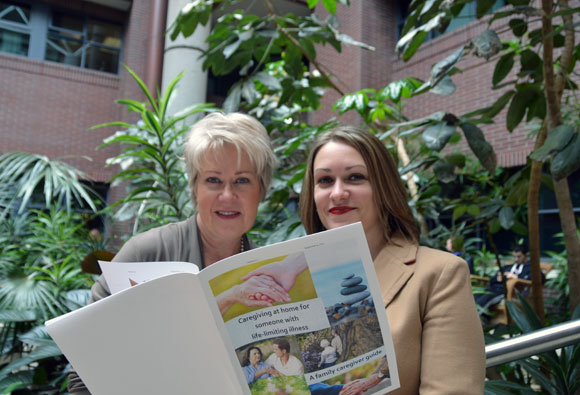
Carole Robinson and Janelle Zerr are looking for feedback on the new decision support guide that has been designed to help family members who are caring for terminally-ill patients.
Student evaluates guide designed to help those caring for terminally-ill patients
Caring for a loved one with terminal cancer is a big job. And people in caregiver roles often have questions: What resources are available to help? How do you manage difficult symptoms? How long can your family member stay at home? How do you get to the many medical appointments? What’s next?
Adding to the stress, many caregivers forget to take care of themselves. Meals are missed; appointments are skipped and sleep is disrupted. But decisions need to be made.
Janelle Zerr, completing her master of science in nursing at UBC’s Okanagan campus, works with Assoc. Prof. Carole Robinson on a project aiming to help families through this challenging time. Robinson’s research team has developed a decision support guide that will serve as a resource for people who are caring for a family member at home who is living with advanced cancer. Zerr is evaluating the guide as part of her graduate research.
“Families are currently caring for a growing number of Canadians with advanced life-limiting illness and they are an essential part of patient care,” Zerr says. “They provide the majority of physical and emotional care for these individuals and they are dedicated to doing their best as caregivers, yet they often experience feeling unprepared and unsupported in the work.”
The study is titled An Evaluation of a Family Decision Guide: Making Decisions About Providing Care at Home for Someone who has Advanced Cancer. Zerr is looking for 12 to 20 current family caregivers to participate in a two-hour face-to-face interview to review and discuss the guide. Family caregivers can include anyone who provides the majority of the emotional and/or physical care for the individual with advanced cancer. This includes immediate family, friends, and neighbours, both men and women; aged 19 and over.
“Family caregivers’ expert perspectives on the usefulness of the guide will be used to modify the tool and enhance its usefulness,” says Zerr. “The goal is to help caregivers provide better care at home for as long as possible and, at the same time, maintain their own health and wellbeing.”
The guide aims to help caregivers assess their personal situation, their need for help, available options for caring for their loved ones, and reasons to choose these options. This includes thinking about resources in their area, and how to plan for alternate ways of caring for their loved ones, explains Robinson.
“This family caregiver decision support guide has been designed to assist family caregivers to navigate their way through the decisions and processes of caring for someone with advanced cancer at home,” says Robinson. “Janelle’s study will help us to refine a resource that helps address caregiving concerns and hopefully, makes caring for a loved one a little bit easier.”
—30—